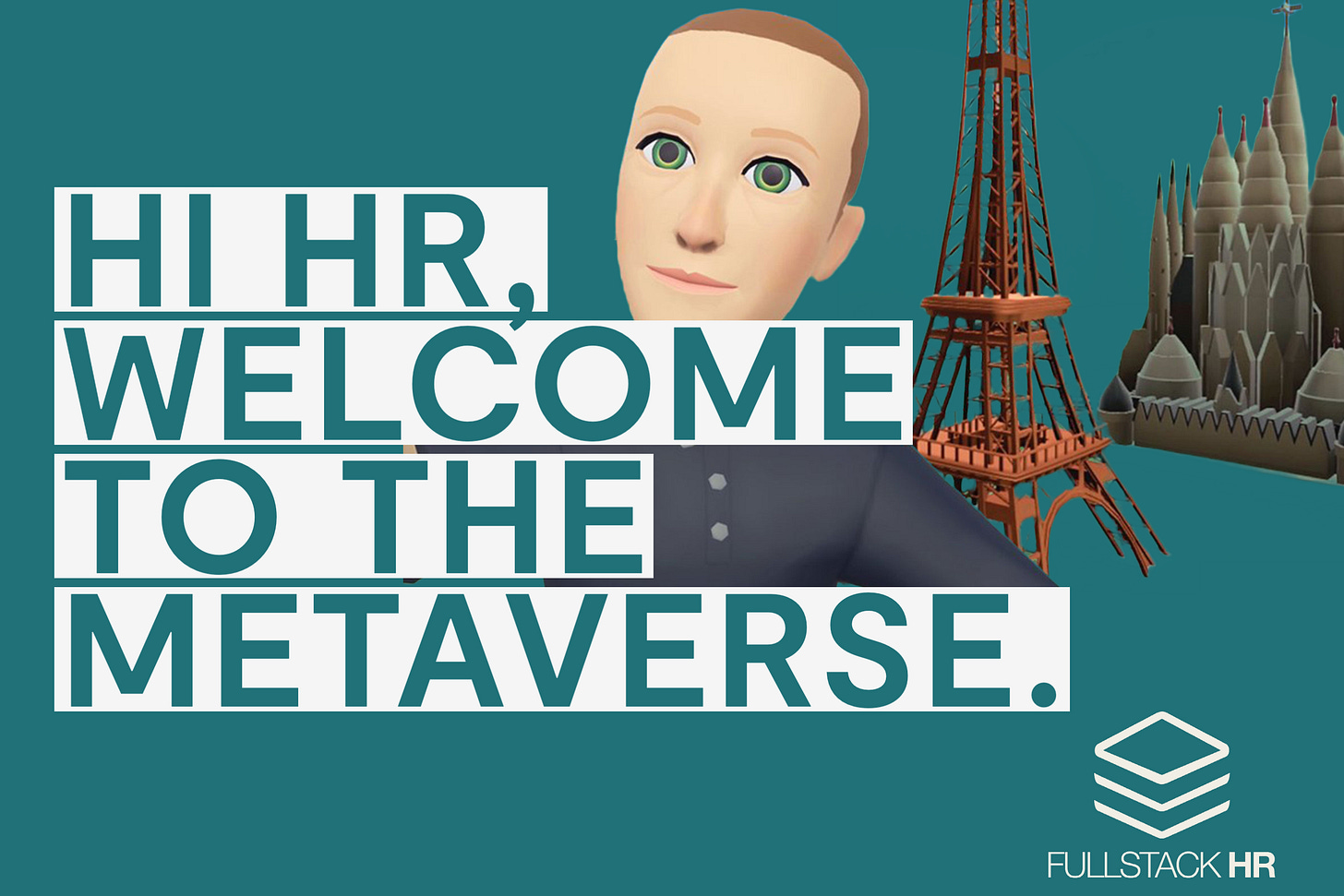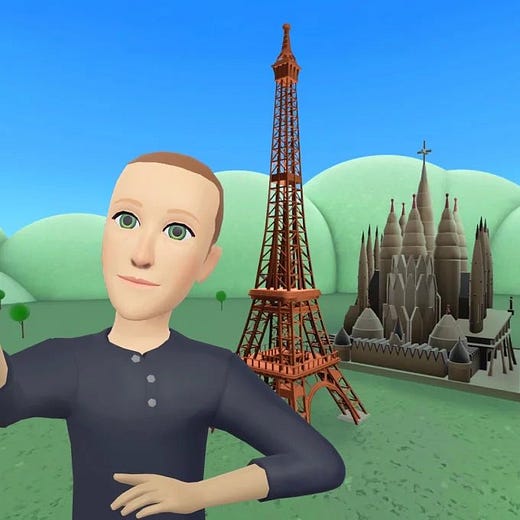Hi HR, welcome to the metaverse.
People, start your VR headsets!
Welcome to the 98 new FullStack HR subscribers! We’re now close to the 2000 subscribers mark. 🤯
If you are not yet subscribed and want to join like-minded, future-thinking people, make sure to subscribe.
You can also listen to this episode on Spotify or Apple Podcast.
Hi 👋,
Last week I published on Monday. And this week, I will post on Tuesday.
And it’s not that I’m doing that by accident. I’m simply trying to switch days when I publish here. So from now on, I’ll try Tuesdays!
You can always listen to this episode on Spotify or Apple Podcast if you prefer that versus reading it!
Today’s topic is near and dear to my heart. It’s easy to get caught up in the negative sentiment that’s all over the news now. Everything seems to turn down, and there’s no future-looking movement. It’s not true, and the metaverse is perhaps the most prominent example. The development is rapid, and I’m guessing it will continue over the coming years.
But enough of this. Let’s get to it.
Exactly one year ago, I wrote this. Following primarily Microsoft and (then) Facebook's talks about VR, I thought it was written all over the sky that the next big thing they would focus on was the metaverse.
A couple of weeks later, Facebook announced its name change, and the metaverse became the talk of the town, but what has happened since? I mean, beyond everyone writing articles like mine on “Metaverse and HR” and saying something in the line around “HR should start using it.” (Yes, I’m looking at all of you start-ups-in-the-HR-space trying to generate FOMO content.)
So what should you do? And what’s in store for HR when it comes to the metaverse?
It’s time for the now annual Metaverse post!
It’s still easy to think that the Metaverse and VR/AR are just a fad. Like a mosquito that found its way into your tent, it will hopefully go away if you ignore it long enough. We could argue around that endlessly, but looking at where the big players are spending their money, I bet it will not only be around but improve tremendously over the coming years and eventually become where we spend most of our time.
Microsoft says the technology has the potential to become 100x better and is a trillion dollar opportunity long term and a 100 billion dollar opportunity short term up until 2025. No wonder they are betting so hard on the space. No surprise there’s hype around the metaverse.
But as always, let’s look at the hype and what and how to think about the future of the metaverse in connection to HR.
We’ll start with a short recap of the metaverse and its definition, use cases I’ve stumbled across for HR, and what the future might have in store.
Think of it as inspiration and not a handbook.
What even is the metaverse?
Just as last year, Wikipedia describes the metaverse as:
"The word "Metaverse" is made up of the prefix "meta" (meaning beyond) and the stem "verse" (a back-formation from "universe"); the term is typically used to describe the concept of a future iteration of the internet, made up of persistent, shared, 3D virtual spaces linked into a perceived virtual universe."
The term itself was coined in the novel Snow Crash in 1992. But there is still an endless debate about what makes up the metaverse. What most people mean when they talk about the metaverse is a virtual space where you, together with others, can experience stuff, usually through some VR glasses. A world beyond the physical world. An immersive experience that feels more “real” than our current digital everyday experiences.
One could argue that our Zoom meetings are happening in the metaverse; they’re just not 3D meetings. Metaverse-puritans might hate me for this, but I think it holds somewhat true, given the definition above. I say this because we sometimes think of the metaverse as something big, new, and scary.
It won’t be. Why? Because technological changes happen incrementally.
It’s likely a gradual, slow shift into the “new.” There won’t be a grand opening of the metaverse one day. We will slowly but steadily move into this new reality.
Look back on how we adopted mobile phones.
It wasn’t overnight.
At first, they were big and clunky. You had them in a briefcase. Almost no one had them. They lasted for a couple of minutes. But through incremental upgrades, we now live more or less our lives through our mobile devices. It didn’t happen overnight; it was a long but steady process that brought us here today. Looking back, we can see that certain events accelerated the development, such as the launch of the iPhone.
We will most likely see something similar when moving to the metaverse. Be on the lookout; Meta, for example, is hosting their 2022 connect conference in a couple of weeks.
The metaverse is happening and will impact us; we must find ways to deal with it.
What’s cooking?
Many applications are popping up around VR and AR, with companies and individuals experimenting with ways to use them for training, recruitment, team building, and more.
My favorite one so far is Wondder. At the moment, it's specifically tailored to train people around diversity and inclusivity. Everyone gets a headset and then experiences what it's like to become the other gender.
Here's how Wondder describes themselves;
"Here, you become somebody with different skin color or gender. You then experience the world through their eyes."
It's a great example of how VR can help train people and put them in situations that create experience-based learning, followed by a discussion of the experience. When talking to Daniel, one of the co-founders, he explained that;
"When we created this experience, we wanted the grumpy old man in the corner to experience what it was like being a young, black female first day at work. And we can create such an experience! And then, reflect on that experience, which is new for many people."
It's an example where the technology and software have become cheap enough to be widely distributed. If you don't have your own VR headset, Wondder will provide you with one. It automatically increases engagement in training. People can't look at their phones; they must immerse themselves in the experience. It creates a much deeper and richer learning experience.
Wondder is just one example of how training can elevate to the metaverse. I like Wondder because it addresses an area where many companies struggle to educate their employees. We've seen VR training, but they are usually more specific.
VR training for surgeons is showing promising results.
Volkswagen is training its assembly workers on new procedures, minimizing the risk of errors even before production starts and significantly reducing the overall training costs. (At least according to them and the company they worked with.)
Onboarding is another excellent opportunity for VR. United Rentals cut training time for new employees by 40% by moving their onboarding from in-person to VR.
Nationwide Insurance used VR to train claims adjusters and found it more effective than in-class classroom training.
Training employees in new ways of working is becoming a critical competitive advantage for businesses; using VR is an effective way to train new staff quickly and cheaply.
And that's also why this is where we'll see most innovation happen short term. The possibilities are almost endless, and companies that are now also distributed, having a hybrid workforce, will see the benefit of utilizing this technology to their advantage.
If this trend continues, we will move more training to a VR environment, meaning that HR will need to upskill our skills when creating training for the metaverse. If you want to future-proof your career, start practicing now. (But don't blame me if I'm wrong here...)
If I last year said, "do nothing, monitor the space," I now say - if you need to train people one way or another - look up how you could do it in VR. All results point towards this being an excellent way of doing it. We might be bound for a recession, and to come out stronger, one way is to train and educate your people, so there might be no better time than now to do it.
Meetings in VR? Really?
Last year I advocated for meetings in the metaverse, believing we would all meet there sooner or later. Will we? Will we all look like Mark Zuckerberg's clunky avatar?
Will we be willing to spend our days in big, warm headsets? Probably not.
(Even though Meta's new headset seems slicker than ever before.)
While Facebook's Horizon Workrooms and the "infinite office" seek to replace your Zoom meetings with a shiny Star Trek-esque experience, they still have a bit to go before we can replace our weekly meetings with a 30-minute virtual hangout.
The picture I painted last year isn't necessarily wrong, but that's too far in the future to be relevant right now. The potential for meetings VR is still huge, but it will not be the first frontier.
So, where will we land regarding HR and the Metaverse?
The jury is still out.
As mentioned initially in this text, my firm belief is that VR, AR, and the metaverse are things that will take time to happen.
Technology shifts don’t happen overnight. Instead, we've seen it slowly build momentum over time. That is what will happen with the metaverse as well.
And eventually, it may become commonplace to hop on a virtual meeting once or twice a month for a monthly review or planning session.
And eventually, you will wake up, put your headset on and go to work.
But that’s a bit later down the road.
Right now, piggyback on the first frontiers of VR, such as training. Experiment within your context. See what works and what doesn't. Let one team try VR training. Start small and scale slowly. Be ready to change course if you find something better.
Read and listen to other people’s experiences, as with the shift to a more mobile-based world, there will be a lot of hype, and you can only navigate the hype if you are well-educated and well-informed - so make sure you stay up to date!
And remember - when it comes to innovation, most success stories start with one brave soul taking the first step towards something new.
You could be that one.






